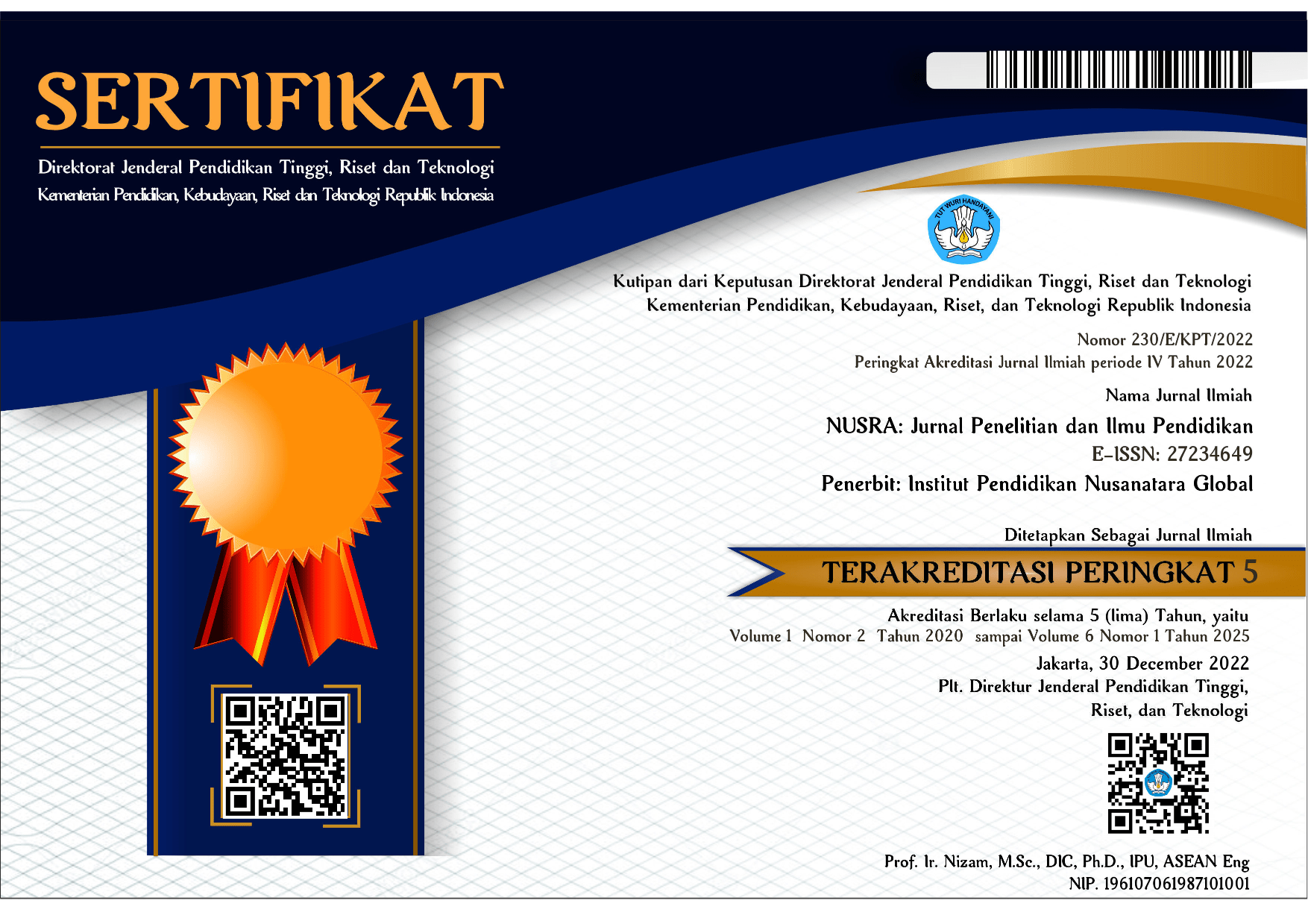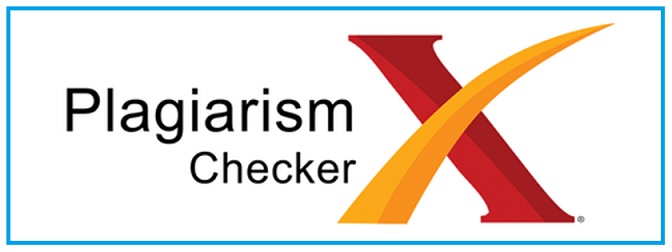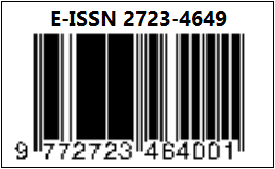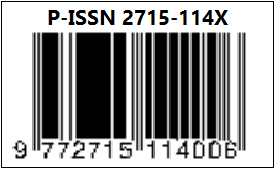PROFIL KEMAMPUAN PENALARAN MATEMATIKA DAN POTENSI KOGNITIF SISWA MA DALAM MENYELESAIKAN SOAL TES POTENSI SKOLASTIK (TPS)
DOI:
https://doi.org/10.55681/nusra.v3i2.456Keywords:
Mathematical Reasoning, Cognitive Potential, Scholastic Potential TestAbstract
Mathematical reasoning and cognitive potential are two student competencies assessed in the SNBT 2023 scholastic potential test. Mathematical reasoning is a student's cognitive ability in making decisions based on analysis, justification, problem solving, and evaluation of problem solving strategies based on data/information on problems solved in everyday life. The aim of the study was to obtain a profile picture of the mathematical reasoning abilities and cognitive potential of SMA students in solving TPS SNBT questions in one of the Privat SMA in East Lombok district, NTB. This research is a qualitative research with a case study design. The participants in this study were 24 students of class XII IPA SMAS Lombok Timur consisting of 8 male students and 16 female students in the odd semester of the 2022-2023 academic year. The instruments in this study were tests of mathematical reasoning and cognitive potential, interviews, observations, and documentation studies. Participant taking technique is done by purposive sampling technique. Data collection was carried out using test and non-test data. The results showed that the profile of students' mathematical reasoning ability and cognitive potential was at a high level in solving TPS SNBT questions but still found: (1) students had difficulties in understanding aspects so students could not identify and understand problems, (2) students had difficulties in modeling aspects /representation of situations so that students cannot make mathematical representations of problems, both models and other mathematical sentences, (3) students have difficulty in cognitive/concept aspects so students cannot create or come up with new strategies in solving problems, and (4) students have difficulties in aspects applied so that students are not able to make and carry out strategies and arithmetical operations correctly.
Downloads
References
Ariati, C & Juandi. 2022. Kemampuan Penalaran Matematis: Systematic Literature Review. LEMMA: Letters Of Mathematics Education, Volume 8, No.2, Juni 2022 pp. 61-75
Azizah,R.F, Sunardi, & Kurniawati, D. 2017. Penalaran Matematis dalam Menyelesaikan Soal PISA pada Siswa Usia 15 Tahun di SMA Negeri 1 Jember. Kadikma, Vol. 8, No. 1, hal 97- 104.
Gunhan, B. 2014. A Casestudy on the Ivestigation of Reasoning Skils in Geometry. South African Jurnal of Education, 34(2), 1-19.
Creswell, J. 2015. Riset Pendidikan: Perencanaan, Pelaksanaan, dan Evaluasi riset Kualitatif dan Kuantitatif. Yogyakarta: Pustaka Pelajar.
Desmita. 2010. Psikologi Perkembangan Peserta Didik. Bandung: Remaja Rosda Karya.
Habibah, M. 2020. Analisis Kemampuan Kognitif Peserta Didik (Studi pada LembagaPendidikan MI al-Kautsar Yogyakarta). Journal of Islamic Education Research Vol. 1 No.
Juni (2020).
Hasnawati. 2016. Description of Mathematics Literacy Ability of Students First Secondary School State 15 Kendari Based on Content, Context, Materials, and Process. International Journal of Education and Research Vol. 4 No. 11.
Karim, M. B & Wifroh, S.H. 2014. Meningkatkan Perkembangan Kognitif pada Anak Usia Dini Melalui Alat Permainan Edukatif. Jurnal PG-PAUD Trunojoyo, Volume 1, Nomor 2, Oktober 2014, hal 76-146.
Matejko, G. R. Price, M. M. M. Mazzocco, & D. Ansari, 2013. Individual differences in left parietal white matter predict math scores on the Preliminary Scholastic Aptitude Test, Journal Neuroimage, vol. 66, pp. 604–610.
Nurahman, I. 2020. Pembelajaran Kooperatif Tipe Team-Accelerated Instruction (TAI) Untuk Meningkatkan Kemampuan Penalaran dan Komunikasi Matematika Siswa SMP. PJME: Pasundan Journal of Mathematics Education 1(1), 96-130.
Nurlindayani, E, Setiono, & Suhendar. 2021. Profil Hasil Belajar Kognitif Siswa Dengan Metode Blended Learning Pada Materi Sistem Pernapasan Manusia. BIODIK: Jurnal Ilmiah Pendidikan Biologi, Volume 7, Nomor 02, Tahun 2021, Hal. 55-62.
Octriana, I, Putri, R.I.I, & Nurjannah. 2019. Penalaran Matematis Siswa dalam Pembelajaran Pola Bilangan Menggunakan PMRI dan LSLC. Jurnal Pendidikan Matematika, Volume 13, No. 2, Juli 2019, pp. 131-142.
OECD. 2019. PISA 2018 Results (Volume I) What Students Know and Can Do. Paris: OECD publishing.
Pusmenjar Kemdikbud. 2020. Desain Pengembangan Soal Asesmen Kompetensi Minimum 2020. Jakarta: Kemdikbud.
Raharjo, S, Saleh, H, & Sawitri, D. 2020. Analisis Kemampuan Penalaran Matematis Siswa dengan Pendekatan Open–Ended dalam Pembelajaran Matematika. Paedagoria: Jurnal Kajian, Penelitian dan Pengembangan Kependidikan, Vol. 11, No. 1, April 2020, Hal. 36-43.
Rizta, A., Zulkardi, Z., & Hartono, Y. (2013). Pengembangan Soal Penalaran Model TIMSS Matematika SMP. Jurnal Penelitian Dan Evaluasi Pendidikan, 17(2), 230–240.
Safrida, Ikhsan, M., & Hajidin. (2019). The Implementation of Discovery Learning Model to Improve Students’ Mathematical Reasoning Skill. International Journal of Sciences: Basic and Applied Research (IJSBAR), 44(2), 19-25.
Tim GLN Kemendikbud. 2017a. Panduan Gerakan Literasi Nasional. Jakarta: Kemdikbud. Tim GLN Kemendikbud. 2017b. Materi Pendukung Literasi Numerasi. Jakarta: Kemdikbud.
Utami, N.P. 2014. Kemampuan Penalaran Matematis Siswa Kelas XI IPA SMAN 2 Painan Melalui Penerapan Pembelajaran Think Pair Square. Jurnal Pendidikan Matematika 3(1).
Wigati, T, Wardono, & Purwanti, E. 2020. Analysis of Mathematical Literacy Skills through PMRI Approaches of Elementary School Students. Journal of Primary Education, Vol 9 (3), 303-310.
Yusdiana, B.I & Hidayat, W. 2018. Analisis Kemampuan Penalaran Matematis Siswa SMA pada Materi Limit Fungsi. Jurnal Pembelajaran Matematika Inovatif, Volume 1, No. 3, Mei 2018, 409-414.
Downloads
Published
How to Cite
Issue
Section
License
Copyright (c) 2023 Samsul Hadi

This work is licensed under a Creative Commons Attribution-NonCommercial-ShareAlike 4.0 International License.














